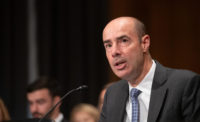Water Infrastructure
Update: New Law Helps Newark, Other Cities Fund Drinking-Water Upgrades
Measure enacted Oct. 4 lets states shift more dollars to drinking-water revolving funds
President Trump has signed a measure, prompted by Newark, N.J.’s problem with lead water service lines, to allow states to tap an additional source of funding for drinking-water system repairs and improvements.
The bill, which Trump signed on Oct. 4, permits states to increase slightly the amount of money they can shift from their Clean Water State Revolving Funds (SRFs) to their Drinking Water State Revolving Funds.
The measure—sponsored by Sen. Cory Booker (D-N.J.), a former Newark mayor and still a city resident—gained final congressional approval on Sept. 17 with the House's unanimous approval. The Senate had passed it on Sept. 9 on a voice vote [view the Senate Environment and Public Works Committee report on the bill here.]
At present, a state can transfer as much as 33% of the amount in one of the water revolving funds to the other water fund. The newly enacted legislation allows a state to shift an additional 5% of its clean water SRF dollars to its drinking water fund.
The higher threshold is only temporary—it wil be in effect only for one year after enactment.
According to Booker’s office, the measure lets New Jersey shift up to $100 million from its clean water SRF to its drinking water fund and offset much of the cost of Newark's $120-million, bond-funded project to replace its lead service lines. [View 9/3/19 ENR story on Newark service line replacement here.]
That financing, via the Essex County Improvement Authority, was announced on Aug. 26.
The transferred funds could also help other New Jersey cities with lead service line problems, Booker's office said.
According to the city, it has about 18,000 privately owned, lead service lines. Of those, about 15,000 are served by the Pequannock water system and are at risk of high levels of lead. About 800 lines had been replaced as of late August.
Story updated on 10/10/19 with Trump's signing the bill.



